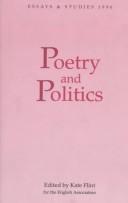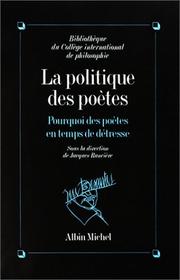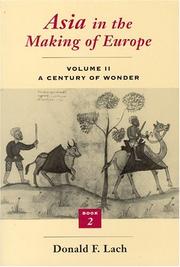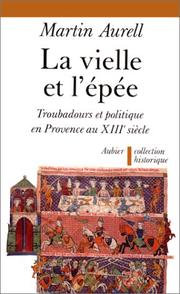| Listing 1 - 10 of 13 | << page >> |
Sort by
|
Book
ISBN: 0571136672 0571139477 9780571139477 9780571136674 Year: 1986 Publisher: London Faber and Faber
Abstract | Keywords | Export | Availability | Bookmark
 Loading...
Loading...Choose an application
- Reference Manager
- EndNote
- RefWorks (Direct export to RefWorks)
Political poetry --- Poetry, Political --- Poetry --- Politics and literature --- Politics in literature
Book
ISBN: 9004323538 9789004323537 9789004323520 900432352X Year: 2016 Publisher: Leiden Boston
Abstract | Keywords | Export | Availability | Bookmark
 Loading...
Loading...Choose an application
- Reference Manager
- EndNote
- RefWorks (Direct export to RefWorks)
The volume dedicates itself to the rather neglected field of political poetry and offers a broad perspective across the centuries from Plato until the post-war period. The first part describes the social function of poetry in Plato, his reception in Heidegger and in Ezra Pound’s poetry. A contribution on Milton complements this with a great poet`s reflection on central political questions. The second part, pre 20th century, is rounded off by two rulers from the edges of Europe or Asia who left their mark both on history and on the literary history of their country: the Georgian king Teimuraz I and the Persian ruler Shah Ismail. This theme is continued in the last contribution dedicated to an outstanding combination of political and poetic talent from recent history, Mao Zedong. Two other contributions refer to the epoch of WWI, Europe`s big cultural caesura, and they dedicate themselves to two eminently influential figures, Stefan George and Vladimir Mayakowsky.
Political poetry --- European poetry --- Politics in literature --- European literature --- Poetry, Political --- Poetry --- Politics and literature --- History and criticism
Book
ISBN: 1283198649 995671738X 9786613198648 9956717509 9956615722 9789956717507 9956558192 9789956558193 9789956558193 9789956615728 9956558192 Year: 2008 Publisher: Cameroon : Langaa Research & Pub. CIG,
Abstract | Keywords | Export | Availability | Bookmark
 Loading...
Loading...Choose an application
- Reference Manager
- EndNote
- RefWorks (Direct export to RefWorks)
Bate Besong was Cameroon?s most vocal and controversial poet, playwright and scholar, who died in March 2007. The poems in this collection are a tribute to the man and his work, and provide a snapshot of the mood that prevailed after his death. Bate Besong ushered in a new kind of nationalist ?fighting? literature in Cameroon, unapologetic in its defense of Cameroon?s Anglophone minority and scathing in its denunciation of postcolonial African dictators and their foreign collaborators. These poems defy Bate Besong?s death by affirming that his impact as a writer lives on. 34 poems are included
Political poetry. --- Cameroonian poetry (English) --- Cameroon poetry (English) --- English poetry --- Cameroonian literature (English) --- Poetry, Political --- Poetry --- Politics and literature --- Politics in literature --- Besong, Bate. --- Nigeria --- In literature.

ISBN: 0859915042 9780859915045 Year: 1996 Volume: n.s., 49 Publisher: Cambridge : D.S. Brewer,
Abstract | Keywords | Export | Availability | Bookmark
 Loading...
Loading...Choose an application
- Reference Manager
- EndNote
- RefWorks (Direct export to RefWorks)
Poetry --- English literature --- anno 1700-1799 --- anno 1900-1999 --- anno 1800-1899 --- English poetry --- Poésie anglaise --- History and criticism --- Political aspects --- Histoire et critique --- Aspect politique --- Poésie anglaise --- English poetry - History and criticism --- English poetry - Political aspects
Book
ISBN: 1421408554 1421408546 Year: 2012 Publisher: Baltimore : Johns Hopkins University Press,
Abstract | Keywords | Export | Availability | Bookmark
 Loading...
Loading...Choose an application
- Reference Manager
- EndNote
- RefWorks (Direct export to RefWorks)
Sounding Imperial offers a more nuanced sense of poetry's unseen role in larger historical processes, emphasizing not just appropriation or collusion but the murky middle range in which most British authors operated during their colonial encounters and the voices that they used to make those cross-cultural encounters seem vivid and alive.
English poetry --- Imperialism in literature. --- Political poetry --- Politics and literature --- Politics in literature. --- History and criticism. --- History --- Political science in literature --- Literature --- Literature and politics --- Poetry, Political --- Poetry --- Politics in literature --- History and criticism --- Political aspects

ISBN: 2226057498 9782226057495 Year: 1992 Publisher: Paris : Albin Michel,
Abstract | Keywords | Export | Availability | Bookmark
 Loading...
Loading...Choose an application
- Reference Manager
- EndNote
- RefWorks (Direct export to RefWorks)
Poetry --- Comparative literature --- Thematology --- Political poetry --- Politics and literature --- History and criticism --- Poésie politique --- Poésie révolutionnaire --- Poésie patriotique --- Politique et littérature --- -Politics and literature --- Literature --- Literature and politics --- Poetry, Political --- Politics in literature --- Political aspects --- Poésie politique. --- Poésie révolutionnaire. --- Poésie patriotique. --- Political poetry - History and criticism
Book
ISBN: 9782728309689 272830968X Year: 2014 Volume: 484 Publisher: Rome : Ecole française de Rome,
Abstract | Keywords | Export | Availability | Bookmark
 Loading...
Loading...Choose an application
- Reference Manager
- EndNote
- RefWorks (Direct export to RefWorks)
Janvier 27 avant notre ère : sur les décombres de la défunte République, Octavien/Auguste posait les fondations du Principat. À ses côtés, fidèle entre tous, Mécène, appelé à devenir l’archétype du patron littéraire. Depuis les guerres civiles, certains des poètes les plus en vue à Rome bénéficiaient de sa protection et de ses largesses. Il n’en fallut pas plus pour que le soupçon d’instrumentalisation naisse chez les Modernes. À rebours des théories classiques, l’auteur s’attache à démontrer que les poètes n’ont jamais eu à souffrir de ce compagnonnage. Non seulement le pouvoir naissant ne chercha pas à instrumentaliser leur talent afin d’asseoir le régime nouveau, mais ce sont bien plutôt les poètes qui prétendirent influencer ce dernier. Les liens entre la poésie et le politique dépassent toutefois la seule question de l’instrumentalisation. La période qui va de la fin de la République au début du Principat a été marquée par une vie littéraire florissante. Virgile, Horace, Properce, Tibulle, Ovide, d’autres encore, menèrent alors les lettres latines à leur apogée. Ils entendirent donner à la poésie latine la prééminence sur sa rivale grecque. Ils parachevaient là une dynamique apparue au tournant du milieu du Ier avant notre ère Chapeautés par leurs patroni, ils souhaitèrent associer Octavien/Auguste à ce mouvement. Loin d’avoir joué le rôle d’initiateur, le Princeps répondit à une attente pressante, sans éclipser pour autant le rôle des aristocrates dans le domaine littéraire. Au fil des pages, le livre dévoile les modalités de la vie littéraire à Rome dans un contexte politique singulier. Il met en cause l’existence des cercles littéraires tout en analysant l’intérêt des aristocrates comme Mécène, Messalla ou Pollion à protéger les poètes et les caractéristiques de ce patronage.
Political poetry, Latin --- Politics and literature --- Propaganda, Roman --- Poésie politique latine --- Politique et littérature --- Propagande romaine --- History and criticism --- Histoire et critique --- Rome --- History --- Histoire --- Latin poetry --- Political aspects --- Poésie politique latine --- Politique et littérature --- Histoire et critique. --- Latin poetry - Political aspects --- Politics and literature - Rome

ISBN: 1282538802 9786612538803 0226467120 9780226467122 0226467333 9780226467337 Year: 1977 Publisher: Chicago University of Chicago Press
Abstract | Keywords | Export | Availability | Bookmark
 Loading...
Loading...Choose an application
- Reference Manager
- EndNote
- RefWorks (Direct export to RefWorks)
Praised for its scope and depth, Asia in the Making of Europe is the first comprehensive study of Asian influences on Western culture. For volumes I and II, the author has sifted through virtually every European reference to Asia published in the sixteenth-century; he surveys a vast array of writings describing Asian life and society, the images of Asia that emerge from those writings, and, in turn, the reflections of those images in European literature and art. This monumental achievement reveals profound and pervasive influences of Asian societies on developing Western culture; in doing so, it provides a perspective necessary for a balanced view of world history. Volume I: The Century of Discovery brings together "everything that a European could know of India, Southeast Asia, China, and Japan, from printed books, missionary reports, traders' accounts and maps" (The New York Review of Books). Volume II: A Century of Wonder examines the influence of that vast new body of information about Asia on the arts, institutions, literatures, and ideas of sixteenth-century Europe.
East and West --- History. --- Europe --- Asia --- Civilization --- Asian influences. --- Discovery and exploration. --- asian, eastern, western, international, global, european, history, historical, academic, scholarly, research, language, literary, art, artistic, arts, literature, books, reading, comprehensive, study, reference, 16th, century, writing, life, society, social, culture, cultural, influential, world, india, southeast, china, japan, report, narrative, poetry, political, linguistics, geographical, regional.
Book

ISBN: 9782364420588 236442058X Year: 2016 Volume: 49 Publisher: Paris : Ed. de Boccard,
Abstract | Keywords | Export | Availability | Bookmark
 Loading...
Loading...Choose an application
- Reference Manager
- EndNote
- RefWorks (Direct export to RefWorks)
Odes, Latin --- Latin poetry --- Literature and society --- Politics and literature --- History and criticism --- Social aspects --- Political aspects --- Greek influences --- Poésie lyrique latine --- Influence grecque --- Horace (0065?-0008? av. J.-C.). --- Conferences - Meetings --- Influence grecque. --- Horace (0065?-0008? av J-C) --- Odes, Latin - History and criticism - Congresses --- Latin poetry - Social aspects - Congresses --- Latin poetry - Political aspects - Congresses --- Latin poetry - Greek influences - Congresses --- Literature and society - Rome - Congresses --- Politics and literature - Rome - Congresses

ISBN: 2700722221 9782700722222 Year: 1989 Volume: vol *15 Publisher: Paris : Aubier-Montaigne,
Abstract | Keywords | Export | Availability | Bookmark
 Loading...
Loading...Choose an application
- Reference Manager
- EndNote
- RefWorks (Direct export to RefWorks)
Poetry --- Provençal, Occitan literature --- Sociology of literature --- History of France --- Thematology --- anno 1200-1299 --- Provence --- Troubadours --- Provencal poetry --- Poets, Provencal --- Politics and literature --- Political aspects --- Political and social views --- History and criticism --- -Poets, Provencal --- -Politics and literature --- -Provencal poetry --- -Troubadours --- Jongleurs --- Troubadors --- Musicians --- Poets --- Courtly love --- Trouvères --- Provençal literature --- Literature --- Literature and politics --- Provençal poets --- -Political and social views --- Provence (France) --- -Politics and government --- Provençal poetry --- Politics and government --- Provencal poetry - Political aspects - France - Provence --- Poets, Provencal - Political and social views --- Politics and literature - France - Provence --- Provencal poetry - History and criticism --- TROUBADOURS --- POLITIQUE --- TROUBADOURS PROVENCAUX --- PROVENCE
| Listing 1 - 10 of 13 | << page >> |
Sort by
|

 Search
Search Feedback
Feedback About UniCat
About UniCat  Help
Help News
News